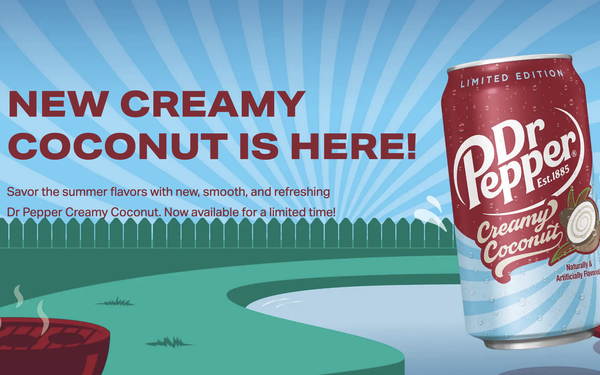
Last Friday, Keurig Dr Pepper
(KDP) held an earnings call with investors to discuss its Q2 earnings report, concluding a series of such calls among the biggest beverage makers after Coca-Cola’s call earlier in the week, and
PepsiCo's earlier in July.
It was first series of investor calls by the makers of the country’s three biggest soft drink brands following the widely reported news of Dr Pepper overtaking
Pepsi for the No. 2 soft drink spot behind Coca-Cola.
Marketing Daily took a look at some of the marketing takeaways from these calls.
Keurig Dr Pepper (KDP)
According to the leaders of KDP, the surge in popularity for its flagship soda brand owes no small debt to innovation and trend watching.
“Keurig Dr Pepper maintained its long-term
track record of market share growth on the back of this year's Dirty Soda inspired Creamy Coconut LTO,” CEO Tim Cofer said, calling the former now KDP’s “most successful”
limited-time offering. “Our ability to steadily grow Dr Pepper by staying on top of trends and continually tapping into the cultural zeitgeist is a defining characteristic of the
brand.”
advertisement
advertisement
The company also discussed the role of acquisitions and partnerships in the hydration and coffee categories, alluding to the Electrolit, Black Rifle Coffee and La Colombe
brands.
“One of our key strategies is consumer-obsessed brand-building. Our innovation ramped significantly in the second quarter and as expected, these new products are seeing good
marketplace traction,” pointing to the access of Canada Dry Fruit Splash as “proving highly incremental to the brand.” Cofer also alluded to upcoming innovations in Q3 and
Electrolit’s sponsorship of Team USA gymnastics as reasons for optimism for the back half of the year.
Coca-Cola
Earlier in the week, Coca-Cola chairman and CEO James
Quincey focused on Studio X, which Coca-Cola launched last year as a “digital and organizational ecosystem” integrating its marketing capabilities and connecting them to its global
network.
“We're producing tailored content at scale and with speed and are able to measure impact in real time. We're also refining our innovation process to prioritize bigger and bolder
bets and we're removing barriers to deliver a more holistic approach, the time to launch and improve success rate,” Quincey said.
“We have greatly improved our ability to rapidly
produce and deliver marketing content, integrate activations with timely innovation and scale successes to drive the greatest impact,” QUincey said, pointing to the success of Coca-Cola’s
Marvel partnership in the second quarter, which saw the brand collaborate with Marvel Studio and the Walt Disney Company on scaling packaging connected to digital marketing experiences featuring
Marvel characters across more than 50 markets.
PepsiCo
Pepsi didn’t focus so much on its flagship soft drink brand in its July 11 call with investors, zeroing in on a
different category.
“We’ve been investing in Gatorade, [mostly] on innovation, execution and branding, and that's paying back. The same with Propel,” PepsiCo chairman and CEO
Ramon Laguarta said, referring to the functional hydration space as “a focus for us.”
Earlier this year, PepsiCo introduced its leading sports drink brand’s first unflavored
offering with a campaign introducing Gatorade Water.
Another focus for the company is the Mountain Dew brand. PepsiCo promoted the expansion of Mountain Dew Baja Blast from an LTO to a full
product line with a Super Bowl ad this past February starring Aubrey Plaza. Laguarta said the Mountain Dew brand had returned to growth, in part due to the “ strategic decision to have multiple
flavors driving the brand” and to make Baja Blast “a structural part of the portfolio,” which he said was driving consumers to the brand.